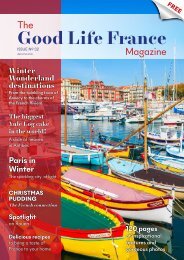Create successful ePaper yourself
Turn your PDF publications into a flip-book with our unique Google optimized e-Paper software.
Opening a bank account is an essential first
step for living in France – and it’s simple and
straightforward. From withdrawing cash,
arranging currency transfers, funding your
property purchase, organising your
insurance policies to setting up direct debits,
standing orders or a savings account. A
dedicated French bank account is essential
for daily life in France.
You can open a bank account remotely and
supply the documentation online, saving you
the hassle of visiting a branch.
If you run a small business in France,
whether it’s a gite, chambre d'hôtes or
another type of commercial venture, you
must open a separate account for any
business-related transactions.
Bank cards
There may be differences in how banks work
in France from your home country, notably
bank cards. In France, most people use débit
cards, with the money deducted from their
bank account immediately or shortly
afterwards. Credit cards are less common.
With a carte de crédit you choose a set date
for payments to make budgeting easier.
Banking services
A RIB (Relevé d'Identité Bancaire) contains
all of your French bank account details: your
unique bank account number, your name,
address of bank and other code information.
When you set up your utilities to pay by
direct debit, they will ask for your RIB.
Cheques are also still widely used in France,
to pay for services or buy groceries. If you
receive a cheque as a payment, sign and
date it on the back before you pay it in to
your bank account.
TIP: Most transactions are completed online
giving you flexibility with your banking. It is
useful though to have a few RIBs printed off
for when you need them. Print these at
home or your bank can supply them free of
charge.
Getting a Mortgage
Compared to the UK, property is generally
more affordable in France. And, there is a
wide choice of properties available: houses
requiring renovation, homes in pretty coastal
or quiet countryside locations, city or town
apartments. As well as land to build new
homes that is often reasonably priced.
When it comes to French mortgages, they’re
worth checking out. Interest rates are low at
present and fixed rate mortgage loans for a
25-year term are widely available.
Important note: French mortgages are
available to residents and non-residents.
Lenders look closely for proof of income and
will calculate the total amount of household
debt (it should not exceed 33% of your
annual income). Get together all of your
paperwork before applying online, including
proof of income, outgoings, assets etc.
Note: Borrowers must sign a sale and
purchase contract for their property before a
lender will issue a formal Mortgage Offer.
Setting up a business
The majority of Britons currently moving to
France are of working age, so earning a living
is clearly key. Many choose to set up their
own businesses and there are a variety of
legal structures enabling you to do this.
Before moving to France you may find it
useful to consult a French based accountant
for advice on the best way of setting up a
business. They can help register you
correctly, complete the necessary paperwork
and also advise on tax issues. If you do not
speak French, there are English speaking
accountants available.


















